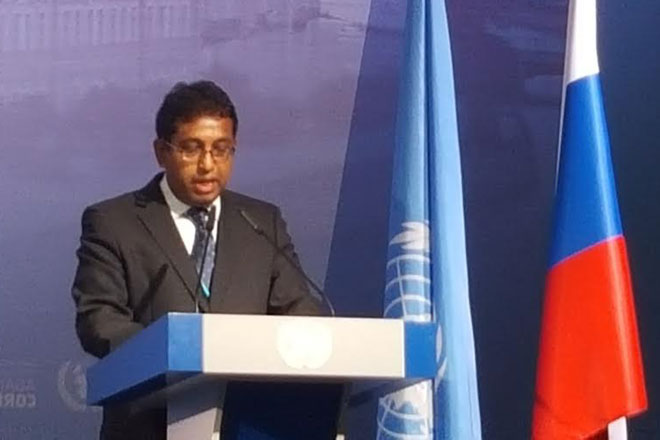Sri Lanka’s anti-corruption efforts are not rhetorical: Harsha De Silva

Nov 04, 2015 (LBO) – Sri Lanka’s new administration has already taken a host of measures to prevent corruption, to seek out stolen assets and to build the capacity for effectively curbing corruption and bribery, in an effective, comprehensive, result-oriented manner, the deputy minister of foreign affairs said.
“Transparency, accountability and the rule of law characterize our current approaches to governance and are in line with Sri Lanka’s international and domestic obligations,” Harsha De Silva, deputy minister of foreign affairs said
“Accordingly, the Government policy is to foster a society with zero tolerance of corruption.”
He made these comments addressing the Conference of State Parties to the UN Convention against Corruption (UNCAC) in the Russian City of St. Petersburgh.
The Deputy Minister outlined the independent institutions that have been put in place, especially following the adoption of the 19th Amendment to Constitution, as well as other investigation mechanisms, pursuant to the mandate received by the Government at both the Presidential and Parliamentary elections.
“I am happy to inform this august forum that, with the enactment of the 19th Amendment to the Constitution, certain principles of the UN Convention against Corruption have been given effect to,” he said.
“We are in the process of taking legislative measures to be in line with UNCAC.”
“With the establishment of a Constitutional Council, several independent Commissions have been established and have been given additional powers to strengthen their mandates, including the Commission to Investigate Allegations of Bribery and Corruption, the National Police Commission, National Audit Commission, National Procurement Commission to name a few,” he said.
“The Presidential Task Force on Stolen Assets Recovery was also established to recover stolen assets belonging to the State.”
De Silva stressed that in a country where anti-corruption was only a rhetorical commitment under the last government, all these measures, aimed to contribute towards a culture of good governance, represented a paradigm shift. He also stated that the National Unity Government was encouraging the civil society and the business to assist in combating corruption.
“The Government of Sri Lanka is also encouraging the participation of civil society and businesses to assist in curbing corruption,” De Silva said.
“In a country where the pursuit of anti-corruption measures was only a rhetorical commitment under the last Government, the number and scale of anti-corruption efforts and mechanisms in place today undoubtedly represents a paradigm shift,”
“The ongoing drive against corruption continues unabated at all levels so that, in a corruption free environment, Sri Lanka will realize the full potential of economic advancement, consistent with SDG16 that calls for an inclusive society with access to justice.”
He said the new administration will intensify these efforts including enhancing the existing domestic legal framework in coming months.
“We have identified the areas in the law and policy, which need to be addressed, as a matter or urgent priority.”
